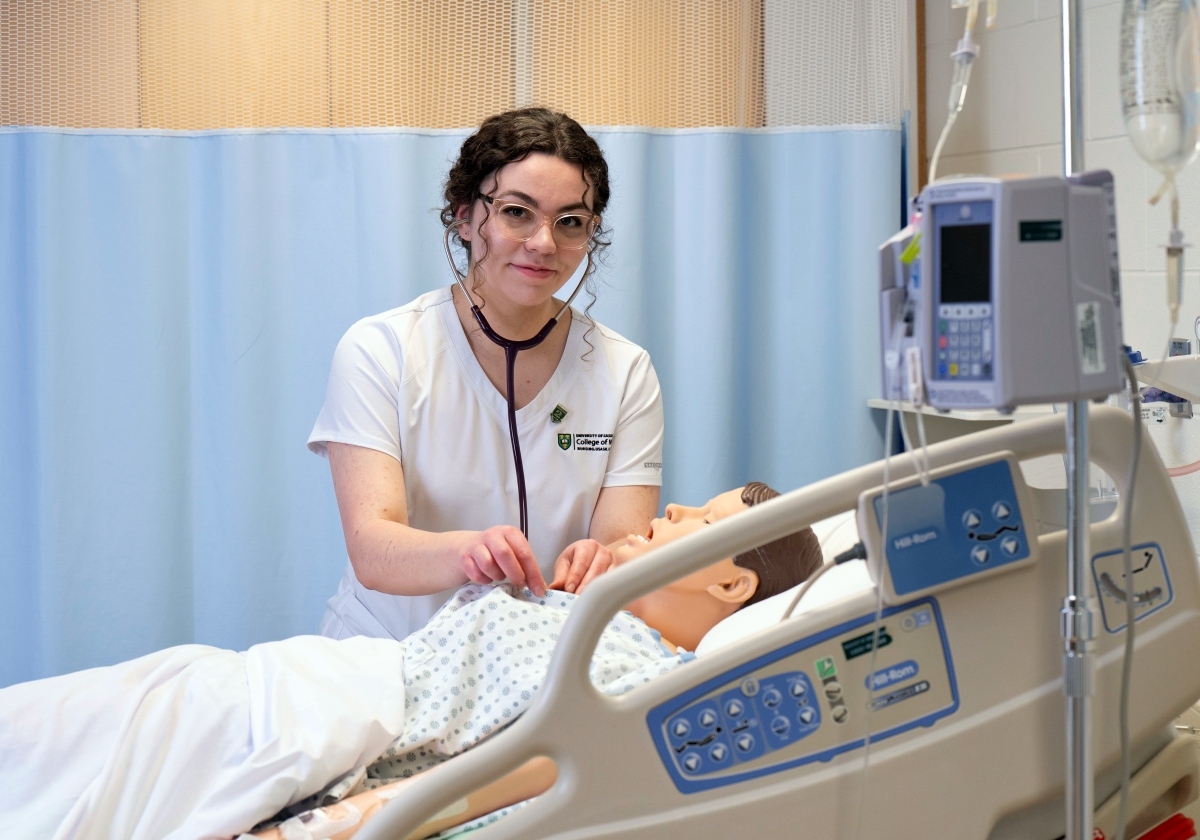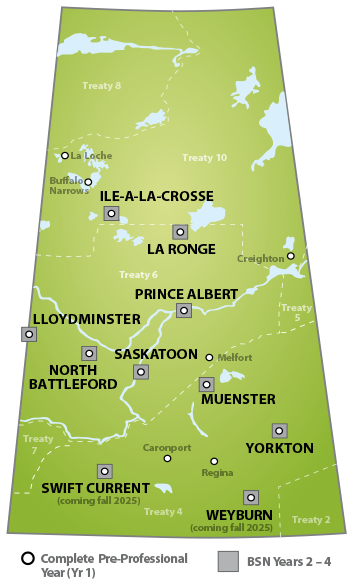
USask College of Nursing continues to expand educational opportunities
The Learn Where You Live teaching model is making nursing education accessible for students like Gracie Paul from Canora, Sask.
By Ray PennerFor decades, “going to university” meant exactly that: moving to a major centre to take your degree on campus. For Saskatchewan’s nursing students, the university now “goes to you.”
Dr. Solina Richter (DCur), dean of the College of Nursing at the University of Saskatchewan (USask) emphasizes the importance of the institution as a university for all of Saskatchewan.
“We are really trying to be inclusive to give people living in rural and remote areas the opportunity to learn where they live.”
The Learn Where You Live model is succeeding and expanding.
In addition to the College’s two campuses in Saskatoon and Prince Albert, there are now six distributed learning sites where students can earn their nursing degree: Île-à-la-Crosse, La Ronge, Yorkton, Lloydminster, North Battleford and Muenster. Two more sites — Swift Current and Weyburn — will open this fall.
In addition to making a nursing degree accessible for Saskatchewan students, the program also plays an important role in addressing critical nursing shortages in the province’s rural areas.
“We know that if our students do their nursing education in these communities and become registered nurses, they are also likely to stay in these communities,” says Richter.
“Especially in our northern communities, nursing students are very acquainted with the local context. They are really familiar with the people and the culture. That helps a lot.”
She adds that 15.3 per cent of College’s students have self-identified as Indigenous.
In total, 3,154 Bachelor of Science in Nursing (BSN) graduates have completed the BSN program since it started the new distributed model in 2012, and another 1,070 undergraduate students are currently enrolled with USask Nursing.
The first year, focusing on the sciences, can be completed at the student’s own pace, and some students may choose to take two or three years to complete it. When students enter their second year, however, they must finish in the next three years.
For those who want to continue with advanced nursing practice as a Nurse Practitioner, they can also study with USask to do so without relocating.
Gracie Paul is now going into her fourth and final year, without ever leaving her home town of Canora, a 30-minute drive north of Yorkton. Her program has involved a mix of regular and online classes, plus clinical work in a hospital setting.
“All my family lives here in Canora. When I’m able to stay at home and study, and commute back and forth to Yorkton, I can have all my support systems here — my friends and family,” says Paul, who adds that class size can be another benefit.
“I went to a small-town high school, so it’s nice to have class sizes of about 10 to 15, so we all know each other. We’re all really good friends. We also get a lot of focused time with instructors.”
When she was in Grade 12, Paul was interested in pursuing a career in health care, but unsure of what area to pursue. The Learn Where You Live model played a major role in convincing her to choose nursing.
For many students— such as the 68 students from northern Saskatchewan who have completed the program — Learn Where You Live makes a nursing degree much more accessible in a number of ways. Completing their studies while based in their home community not only saves the cost of relocating to a larger centre, it also keeps spouses and families together, helps to maintain current employment, eliminates feelings of isolation and generally reduces the psychological as well as financial burden.
Gracie Paul is in the Canadian Armed Forces’ ROTP (Regular Officers Training Plan), so she’s not sure where she will be posted upon graduation. Many of her classmates, though, are planning to stay in Yorkton and area. She, too, likes the idea of someday being a nurse in a community the size of Canora and she understands the challenges these communities face, along with the working environment. “In my town, there’s a large older population, so doctors and nurses that specialize in that area are very much needed.”
Nursing has been described as “the backbone of our health-care system.”
In Saskatchewan, where the pressure on this system is unrelenting, the importance of developing highly qualified nursing graduates cannot be underestimated.
“It’s a lot of organization to offer programming across Saskatchewan,” admits Dean Richter, “but it is so rewarding.”
Gracie Paul echoes that sentiment from a student’s perspective.
“Nursing is a very challenging program, but a very rewarding program, so if you’re thinking about nursing, you should really give it a try.”
This story originally appeared in the Saskatoon StarPhoenix and Regina Leader-Post Nursing Week special feature.
Together we will support and inspire students to succeed. We invite you to join by supporting current and future students' needs at USask.


